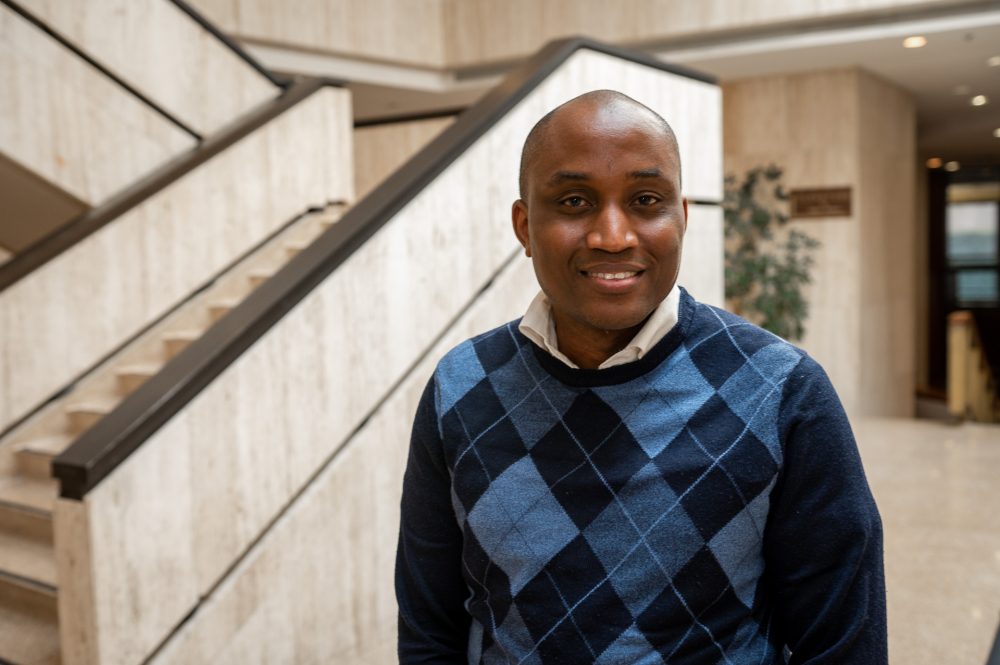After UConn School of Medicine commencement on May 8, Ezigbobiara “Ezii” Umejiego, 37, of Atlanta and originally from Nigeria, is going into the field of ophthalmology with residency training at Howard University.
Q. How excited are you about entering training for ophthalmology?
A. Ecstatic, but it still feels surreal. I am going into ophthalmology at Howard University, a Historically Black College and University (HBCU), to begin my residency training.
Q. What or who inspired you?
A. My mother’s experience dealing with bilateral visually significant cataracts sparked my interest in vision health. However, the opportunity to shadow Dr. Elizabeth Simmons at the UConn Ophthalmology clinic as well as immerse myself in vision research under Dr. Royce Mohan helped solidified my decision to pursue the specialty. As an Ophthalmologist, I will not only be able to provide medical, surgical, and preventive eye care to patients, but I will have the unique privilege to impact their quality of life which can be the difference in them being able to meet their basic needs (and families, as breadwinners) or being reliant on others to meet these needs.
Q. What does UConn School of Medicine mean to you and what did you love most about your experience here?
A. The spirit of camaraderie among fellow students and the supportive environment that the faculty and staff foster within the school. More importantly, there is an avalanche of opportunities to continue to pursue other interests within and outside medicine, whether in scholarship, service, or leadership. I participated in all three, and they not only kept me grounded but also served as a constant reminder of why I chose to pursue medicine.
Q. Why would you recommend UConn medical school to others?
A. You can learn the science of medicine at any medical school within and outside the United States. However, if you want to learn and practice the art of medicine in a collegial, supportive, and uplifting environment, then you should not look any further than UConn School of Medicine.
Q. How has attending medical school at UConn set you up for success as a future physician in the health care workforce?
A. At UConn, we’re not only steeped in a culture of providing holistic and personalized care to all patients we are privileged to serve, but we also imbibe a culture of innovation and service. My diverse experiences at UConn have provided me with a solid foundation that will allow me to thrive in residency and beyond, and it has equipped me with the tools to innovate solutions needed to improve access to quality care for patients in low-resource settings, locally and globally.
Q. How do you feel being apart of UConn medical school’s 50+ year legacy and its impact on the state?
A. I think its an immense privilege to be a part of this incredible legacy, knowing that I have been able to do so by “…standing on the shoulders of giants” (Sir Isaac Newton). It is amazing that at UConn, you do not have to look far to see alums, like Dr. Marja Hurley, who embody what it means to live this incredible legacy and continue to inspire former, current, and future students to contribute to this legacy.
There are also countless number of individuals, organizations, and programs than I can name, that have been integral in attaining and furthering this legacy. However, two programs I would like to highlight and amplify here are the Health Career Opportunity Program (HCOP) and CT AHEC (especially, the Urban Service Track/AHEC and the Migrant Farm Worker Clinic), which have created opportunities for medical students to serve the local communities across the state and inspire both students from within and outside Connecticut to not only pursue health-related careers at UConn, but to stay and serve residents of the state. As a student who was involved in both programs, I cannot overemphasize the influence that these programs have on students and within communities across the state. As such, they deserve our continued and unwavering support.
Q. What are you excited for most in your next phase of your medical career in residency training?
A. The privilege to acquire the knowledge and skillsets needed to become an exceptional ophthalmologist, while also having the unique privilege to care for the urban underserved in D.C.



